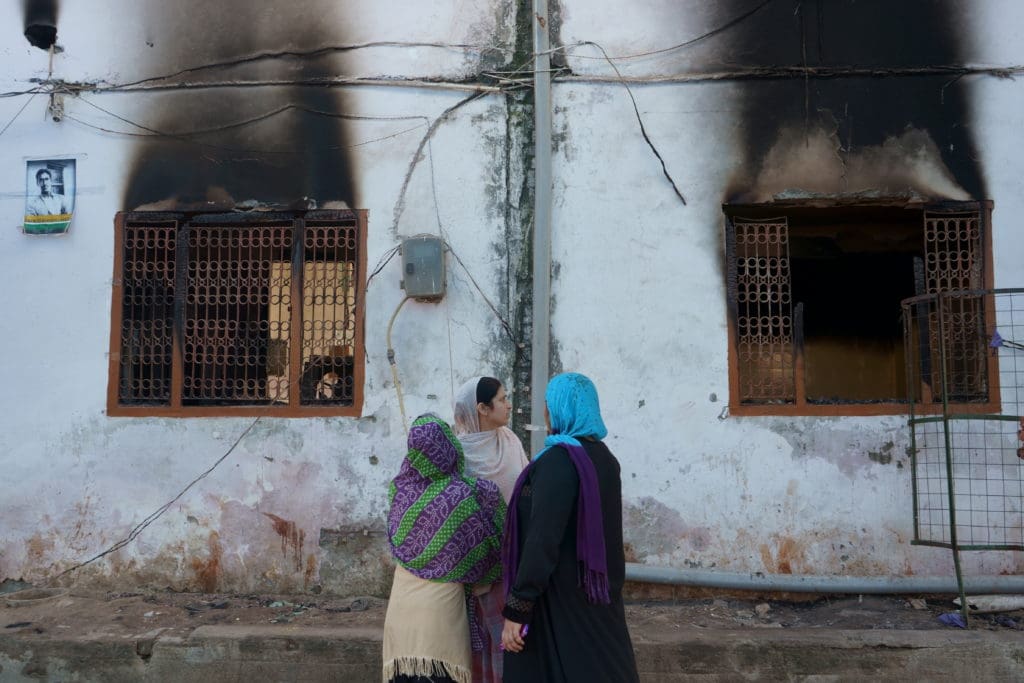
By Noemi Jabois Ahmadabad, India
Shakeela Bano’s family was charred to death in front of her eyes by a blood-thirsty mob of Hindus during the infamous anti-Muslim 2002 Gujarat riots in the western state of India then governed by Narendra Modi, the country’s current Prime Minister.
Modi, a favorite to win second term in office in staggered Indian polls ending May 19, was the chief minister of Gujarat when the orgy of religious violence gripped the state in which over 1,000, mostly Muslims, were slaughtered.
The widespread rape and murder followed the death of 59 Hindu pilgrims on a train that was set on fire allegedly by a group of Muslims.
During his 13 years of governance, Modi was widely credited for transforming Gujarat into an economic hub but the stigma of one of the worst religious riots in independent India earned the right-wing leader a tag of divisive politician.
Modi has largely been accused of not doing enough to stop the riots and save innocent lives. He has denied the allegations and has also been cleared by courts.
But many Muslims, like Bano, in Gujarat’s Ahmedabad city and the surrounding towns and villages, feel otherwise.
The 36-year-old woman vividly remembers how the day after the train was burnt, markets in her area were closed.
There was a large presence of police personnel and groups of angry people emerging from lanes began gathering in Naroda Patiya that had a significant Muslim presence, Bano told EFE.
Amid a palpable sense of fear, her family decided to move to the nearby Gangotri neighborhood.
They asked for help from a man named Bhavani, she said, adding the Hindu acquaintance offered to safeguard the jewelry Bano’s mother had been able to take before leaving their home.
However, as soon as they entered the colony, Bhavani signaled to a mod towards them.
“They poured petrol and burnt alive my mother, my brother, my sister-in-law and four kids. They cut my brothers head with a sword. There was a two-month boy as well. They said when you wont live, what will we do with your kid. The baby was also burnt alive,” Bano recalled the horror.
“I could see it with my own eyes but could not save them,” she said, wiping her tears with one end of her black hijab, a veil worn by some Muslim women
Running away from the mob, Bano said, she hid herself inside a roadside restaurant.
As she peeked out she saw several girls being raped, many others killed and their bodies thrown into a well.
The police, instead of helping the victims, hit and threatened them, she said.
That day at least hundred people were killed in the area in what came to be known as the Naroda Patiya massacre.
But Bano was lucky to find a refuge and was finally taken into a vehicle to one of the several camps for Muslims, set up in Ahmadabad following the days of violence.
She said she testified in a court and identified the alleged killers despite receiving death threats and was even offered money for staying silent.
Without anything to lose, she gave the names of those who killed her family members to the court.
The convicted 32 people and acquitted 29 accused due to insufficient evidence in 2012. But most of convicts have been let out on bail, including Maya Kodnani – former minister for women and child development of Gujarat.
“Narendra Modi has risen because he stands tall on the pile of our dead bodies. If he wanted, he could have stopped the riots and so many people would not have died,” Bano said.
The Gujarat riots had made Modi once an international outcast. The United States had denied him a visa and the United Kingdom cut all ties with the politician. That changed months before Modi became prime minister in 2014.
During the last five years of rule as the head of the government led by the right-wing Bharatiya Janata Party, there has been a series of attacks against Muslims mere on allegation of possessing or eating beef or even transporting cattle.
Cow is considered sacred in the Hindu religion and extremist groups associated with the BJP bay for blood of anyone who slaughters the bovine.
Modi’s critics say the prime minister has never strongly condemned the violence in the name of cow protection.
However, no resentment of Muslims against Modi and his party can be compared to what happened in Gujarat 17 years ago.
Auto rickshaw driver Salim Mohammed Hussain Sheikh recalls who barely two hours after the train with Hindus was set on fire, how members of the RSS – a radical Hindu group and BJP’s ideologue – thronged the streets in Ahmedabad and began harassing the men with beards.
Next morning, Sheikh recalled, he was in a neighborhood mosque when a mob of 1,000 to 1,500 people with arms led by then Minister Kodnani ran the pogrom.
“A BJP minister, Maya Kodnani, came and spoke to the police stationed there. I was quite far from there but I saw she was scolding the police personnel,” Sheikh told EFE.
There was bloodshed and even “the police was also firing along with the mob,” said the man who lost his niece and children in the massacre.
Nazir Khan Pathan, a school teacher, recalled how men associated with the RSS and its affiliate Bajrang Dal, wearing their trademark shorts and saffron scarves on their head, came around and started riots.
Some, he told EFE, were municipal council members and members of the legislative assembly who shouted to the mob, “go ahead, we are with you.”
“The whole series of events was preplanned, and Modi had the biggest role in it,” he alleged.
This story first appeared on efe.com





